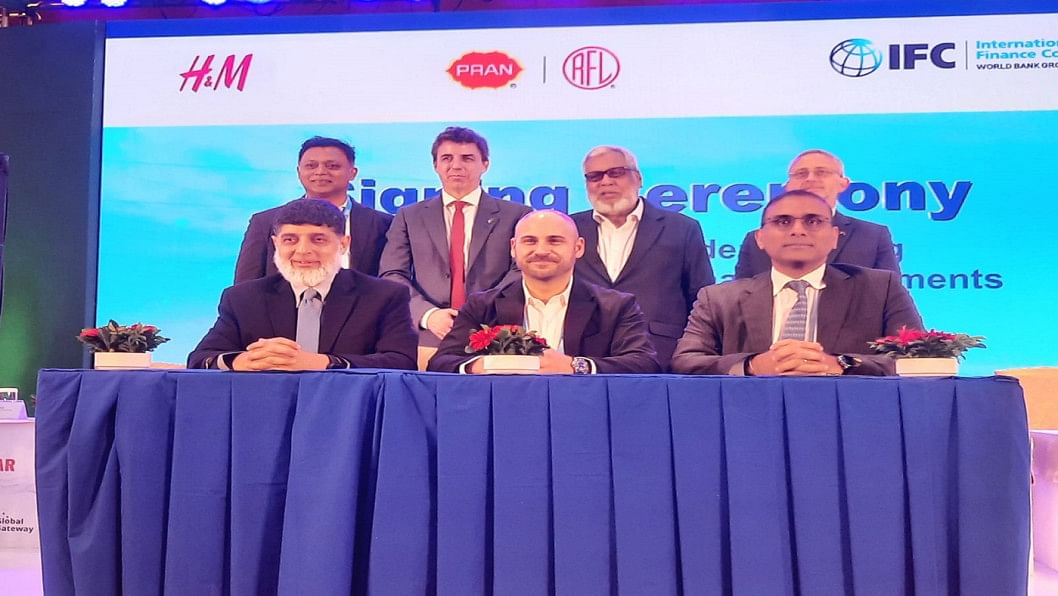Power producer to sell directly to consumer

Bangladesh is getting into the merchant power generation model for the first time with the signing of a memorandum of understanding between an electricity buyer and seller for a solar power plant. It is a model which allows a power producer to sell directly to the consumers.
Swedish multinational fashion retailer Hennes & Mauritz AB (H&M), Bangladesh's Pran-RFL Group and International Finance Corporation (IFC) signed the MoU Yesterday to build a floating solar power plant in Moulvibazar.
Speakers termed the development as a step towards fostering private sector collaboration for renewable energy in Bangladesh.
The MoU was signed on the third day of the Bangladesh Investment Summit 2025 at the InterContinental, Dhaka, during a discussion titled "Unlocking the Potential of Bangladesh for Investors in Renewable Energy".
Muhammad Fouzul Kabir Khan, power, energy and mineral resources adviser, said the government has opened the power sector business for all.
"You can now set up power plants on your own, avoiding red tape, and without seeing my face, and do business and make money," he told the potential investors who joined the summit.
He said the basic difference between the independent power producers (IPP) model and the merchant power producers (MPP) model is that the Bangladesh Power Development Board (PDB) will no longer be the single buyer of the electricity.
"You can now establish a power plant and sell it to the customers of your choice, at a price negotiated between you and the buyer. Only the wheeling charges will be required for the transmission and distribution facilities provided by the government agencies," he said.
Speaking as the keynote speaker, Fouzul said the IPP model has wasted a huge amount of public money over the years and made the electricity prices extortionary. "There was no competition, and there were deals made under the table which increased the power tariff and caused people to suffer. We are paying Tk 3,000 per capita subsidies only for this sector."
With the competitive procurement process, he said, it is possible to provide solar power at a price below the average electricity prices the customers have been paying, he said.
"We have used most of our proven gas reserves… With the current rate of gas extraction, the reserve will last for another eight to 10 years only," he said.
He urged investors to participate in the bidding process for establishing around 5,000 megawatts (MW) solar power plants across the country.
Michael Miller, ambassador and head of delegation of the European Union in Bangladesh, said, "We are committed to helping the interim government deliver reforms in line with the expectations of citizens and of businesses.
"We support a clean economic growth model, reducing carbon emission, enhanced with affordable, secure and clean energy… in return, we need Bangladesh to step up with renewable energy ambitions and to ensure an investment and trade-friendly environment," he added.
During a discussion after the MoU signing, Sarah Negro, global head of public affairs at H&M, said they need to move forward with renewable electricity generation.
"Only the rooftop solar options wouldn't meet our [suppliers] electricity demand. We will need 2,500MW solar just to cover the present use of electricity in our suppliers [garment factories]. Today's MoU wouldn't be able to meet our demand, it is only a start," she said.
Ahsan Khan Chowdhury, chairman and CEO of Pran-RFL Group, said they have 300 acres of water body in Moulvibazar, which would be used for aquaculture and a floating solar power plant.
"I figured that it is a very good business for us as there was no problem with fundings. The IFC and the European Investment Bank were there and there were customers like H&M," he said, adding that the pricing of the electricity from the plant would be cheaper than that of the grid.
Tanveer Mohammad, chief corporate affairs officer of Grameenphone, said they had taken a very aggressive target to reduce the carbon footprints to 50 percent level in 2030 of what they had in 2019, but did not find a way forward.
"The challenge is in our mobile phones. We are using more and more data, and will be consuming three times more electricity in 2030. And the electricity we use from the grid is not clean. That is why we are planning for alternative energy," he said.
He said there are around 22,000 Grameenphone base stations and some data centres across the country. "It's not possible to install solar plants in all those locations. That is why we need a concentrated location where green energy would be produced."
"When the adviser said the MPP is allowed, it comes as a music to my ear. Now I am thinking it is possible to achieve our targets," he added.

 For all latest news, follow The Daily Star's Google News channel.
For all latest news, follow The Daily Star's Google News channel. 



Comments